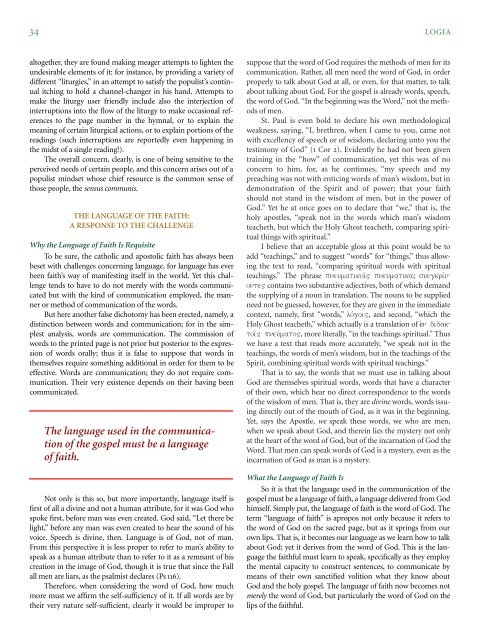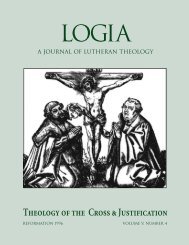THE LANGUAGE OF FAITH 33Donna Shalala, whom many regard as the queen of political correctness,is likewise indicative of the rising national tide of crusadersfor sensitivity. The tomahawk chop, the ethnic joke, eventhe outdated ethnic label, are thought to be in poor taste; indeed,even chivalry is now hopelessly out of date, stigmatized as Victorianand oppressive of women who would prefer standing on thebus or opening doors for themselves to being stereotyped by theimplications of gallantry toward the weaker sex. This, alas, is theworld in which we live, who say with the psalmist, “I am astranger in the earth.”Thus do we find, as all along we should have known wewould, efforts also in the churches to speak with a heightenedsensitivity toward the desires and expectations of the hearers.Even in churches that have no political agenda, who claim thatthe word and the sacraments are their only agenda, such aschurches comprising the great majority of the LutheranChurch—Missouri Synod, there has arisen this new concern forsensitivity toward what people are perceived to want. The ChurchGrowth Movement is, from this vantage point, nothing morethan an outgrowth of the current cultural milieu.It has occurred to me that the Church Growth Movementreally needs a better name, in order that it be more readily identifiedfor what it is. I think it might be more suitable to considerthe Church Growth Movement as a populist movement, becauseof the primary thrust evident in that movement’s main objectives,namely, the making of churches that are deemed successfulin the estimation of the common people, the populus. Webster’sdictionary defines a populist as “a believer in the rights, wisdom,or virtues of the common people,” and thus I find the label fittingbecause what is assumed at the root of this movement’s collectivethought is the notion that especially the wisdom of the commonpeople is worthy of guiding the church. Verily, the ChurchGrowth Movement is marked by the employment of what manywould consider common-sense principles, in the interest of producingmeasurable degrees of success. Since the etymologicalroot of “common sense” would be the Latin sensus communis, wecan derive also the label “populist” from this consideration,namely, of common sense, or sensus communis as the collectivesense or wisdom of the community.Besides, if historians will one day rank this movement alongsidethe great heresies of the past, it really ought to have an adjectivalname, a name ending in -ist or -ism. They won’t just want tosay, “Oh yes, the 1990s, that was the age of the Church GrowthMovement,” for that sounds rather clumsy, don’t you think? Orworse, people might say, “Ah, the 1990s, that was the age ofchurch growth,” a rather positive-sounding label for a very troublingchallenge. In fact “church growth” could not be furtherfrom the truth, from the standpoint of the prosperity of the truechurch, the Bride of Christ—unless, of course, we think ofgrowth as response to this oppression.We might also understand “growth” in a different sense.That is, indeed the church, the Bride, has a growth, a cancer thatis causing her great distress of body and soul. Thus let us elevatethe Church Growth Movement to the status it surely deserves.This is no mere syndrome; it is a real disease, and therefore itmerits a bona fide label, such as all diseases have. I submit thereforethe label “populism.” Henceforth herein I shall use that label,in order to venerate the movement with the degree of honor ithas unquestionably earned.The populist movement is interested in producing “userfriendly churches,” to use the phrase coined by George Barna. 4The subtitle of his book of that name is informative: “What ChristiansNeed to Know about the Churches People Love to Go To.”Here is one book you can judge by its title, for the jacket’s briefprecis includes these words: “What does it mean for a church to beuser friendly? It means providing people with an accessible way toworship God, a comfortable place to bring their friends, and [notehere the key word] a sensitive, creative community they can belongto—one that is [another key word] wise enough not to get in theway of the task at hand: reaching the world for Christ.”The Missouri Synod’s own obsession with Church Growthprinciples is seen especially in the alarming rise of a sentimentthat has no regard for the liturgy or the hymnal. What thisamounts to, in terms of the reasons for this disregard, is a desireto talk about God in a new way, a new style. The Church Growthmoguls are quick to assert that Evangelical style is no threat toLutheran substance, which is simply another way of saying thattheir concern, at least according to their own explanations, is notwith what is being said, but with how we say it.This is no mere syndrome; it is a realdisease ...“populism.”nbFrom the populist view the liturgy is by its very nature animpediment to the church’s success, since the liturgy is neither userfriendly nor sensitive. The words of the liturgy are rote repetitioneach time they are said. That is, the liturgy does not give overt serviceto sensitivity toward the current communal perceptions of thepopulus. It is always the same; how, then, can it be people-oriented,when the perception of people’s needs is ever changing? Further,the liturgy is only known by insiders, those who are already familiarwith it. Thus it cannot help but be insensitive to visitors, thatclass of people the populist movement is primarily concerned with.Not only, the reasoning goes, does the liturgy offend, it offends thevery target group of the populists, the visitors.Thus the liturgy is not, and cannot be, populist in nature, forit does not meet the perceived needs of late-twentieth-centuryAmericans in particular, who do not like to feel as though they donot belong anywhere, least of all in a church! It is well knownamong observers who have occasion to compare American toEuropean church attendance levels that Americans are anextremely church-going people, notwithstanding the commonlament about the size of our delinquent lists! The last thing apopulist will want to do, therefore, is make any American feelout-of-place in the place of worship. The liturgy, by these standards,is quite overdue for a pink slip.Yet there remain a good number among us who are stillloathe to discard so noble a thing, even if they do not knowexactly why. So instead of dismissing the liturgy or the hymnal
34 LOGIAaltogether, they are found making meager attempts to lighten theundesirable elements of it: for instance, by providing a variety ofdifferent “liturgies,” in an attempt to satisfy the populist’s continualitching to hold a channel-changer in his hand. Attempts tomake the liturgy user friendly include also the interjection ofinterruptions into the flow of the liturgy to make occasional referencesto the page number in the hymnal, or to explain themeaning of certain liturgical actions, or to explain portions of thereadings (such interruptions are reportedly even happening inthe midst of a single reading!).The overall concern, clearly, is one of being sensitive to theperceived needs of certain people, and this concern arises out of apopulist mindset whose chief resource is the common sense ofthose people, the sensus communis.THE LANGUAGE OF THE FAITH:A RESPONSE TO THE CHALLENGEWhy the Language of Faith Is RequisiteTo be sure, the catholic and apostolic faith has always beenbeset with challenges concerning language, for language has everbeen faith’s way of manifesting itself in the world. Yet this challengetends to have to do not merely with the words communicatedbut with the kind of communication employed, the manneror method of communication of the words.But here another false dichotomy has been erected, namely, adistinction between words and communication; for in the simplestanalysis, words are communication. The commission ofwords to the printed page is not prior but posterior to the expressionof words orally; thus it is false to suppose that words inthemselves require something additional in order for them to beeffective. Words are communication; they do not require communication.Their very existence depends on their having beencommunicated.The language used in the communicationof the gospel must be a languageof faith.nbNot only is this so, but more importantly, language itself isfirst of all a divine and not a human attribute, for it was God whospoke first, before man was even created. God said, “Let there belight,” before any man was even created to hear the sound of hisvoice. Speech is divine, then. Language is of God, not of man.From this perspective it is less proper to refer to man’s ability tospeak as a human attribute than to refer to it as a remnant of hiscreation in the image of God, though it is true that since the Fallall men are liars, as the psalmist declares (Ps 116).Therefore, when considering the word of God, how muchmore must we affirm the self-sufficiency of it. If all words are bytheir very nature self-sufficient, clearly it would be improper tosuppose that the word of God requires the methods of men for itscommunication. Rather, all men need the word of God, in orderproperly to talk about God at all, or even, for that matter, to talkabout talking about God. For the gospel is already words, speech,the word of God. “In the beginning was the Word,” not the methodsof men.St. Paul is even bold to declare his own methodologicalweakness, saying, “I, brethren, when I came to you, came notwith excellency of speech or of wisdom, declaring unto you thetestimony of God” (1 Cor 2). Evidently he had not been giventraining in the “how” of communication, yet this was of noconcern to him, for, as he continues, “my speech and mypreaching was not with enticing words of man’s wisdom, but indemonstration of the Spirit and of power; that your faithshould not stand in the wisdom of men, but in the power ofGod.” Yet he at once goes on to declare that “we,” that is, theholy apostles, “speak not in the words which man’s wisdomteacheth, but which the Holy Ghost teacheth, comparing spiritualthings with spiritual.”I believe that an acceptable gloss at this point would be toadd “teachings,” and to suggest “words” for “things,” thus allowingthe text to read, “comparing spiritual words with spiritualteachings.” The phrase pneumatikoi'" pneumatika; sungkrivnonte"contains two substantive adjectives, both of which demandthe supplying of a noun in translation. The nouns to be suppliedneed not be guessed, however, for they are given in the immediatecontext, namely, first “words,” lovgoi", and second, “which theHoly Ghost teacheth,” which actually is a translation of ejn didaktoi'"pneuvmato", more literally, “in the teachings spiritual.” Thuswe have a text that reads more accurately, “we speak not in theteachings, the words of men’s wisdom, but in the teachings of theSpirit, combining spiritual words with spiritual teachings.”That is to say, the words that we must use in talking aboutGod are themselves spiritual words, words that have a characterof their own, which bear no direct correspondence to the wordsof the wisdom of men. That is, they are divine words, words issuingdirectly out of the mouth of God, as it was in the beginning.Yet, says the Apostle, we speak these words, we who are men,when we speak about God, and therein lies the mystery not onlyat the heart of the word of God, but of the incarnation of God theWord. That men can speak words of God is a mystery, even as theincarnation of God as man is a mystery.What the Language of Faith IsSo it is that the language used in the communication of thegospel must be a language of faith, a language delivered from Godhimself. Simply put, the language of faith is the word of God. Theterm “language of faith” is apropos not only because it refers tothe word of God on the sacred page, but as it springs from ourown lips. That is, it becomes our language as we learn how to talkabout God; yet it derives from the word of God. This is the languagethe faithful must learn to speak, specifically as they employthe mental capacity to construct sentences, to communicate bymeans of their own sanctified volition what they know aboutGod and the holy gospel. The language of faith now becomes notmerely the word of God, but particularly the word of God on thelips of the faithful.
















